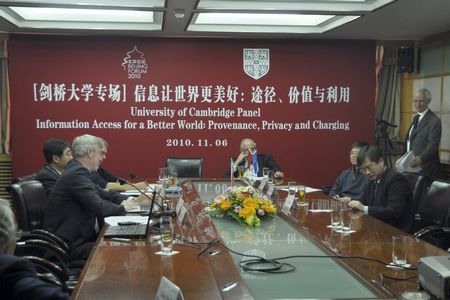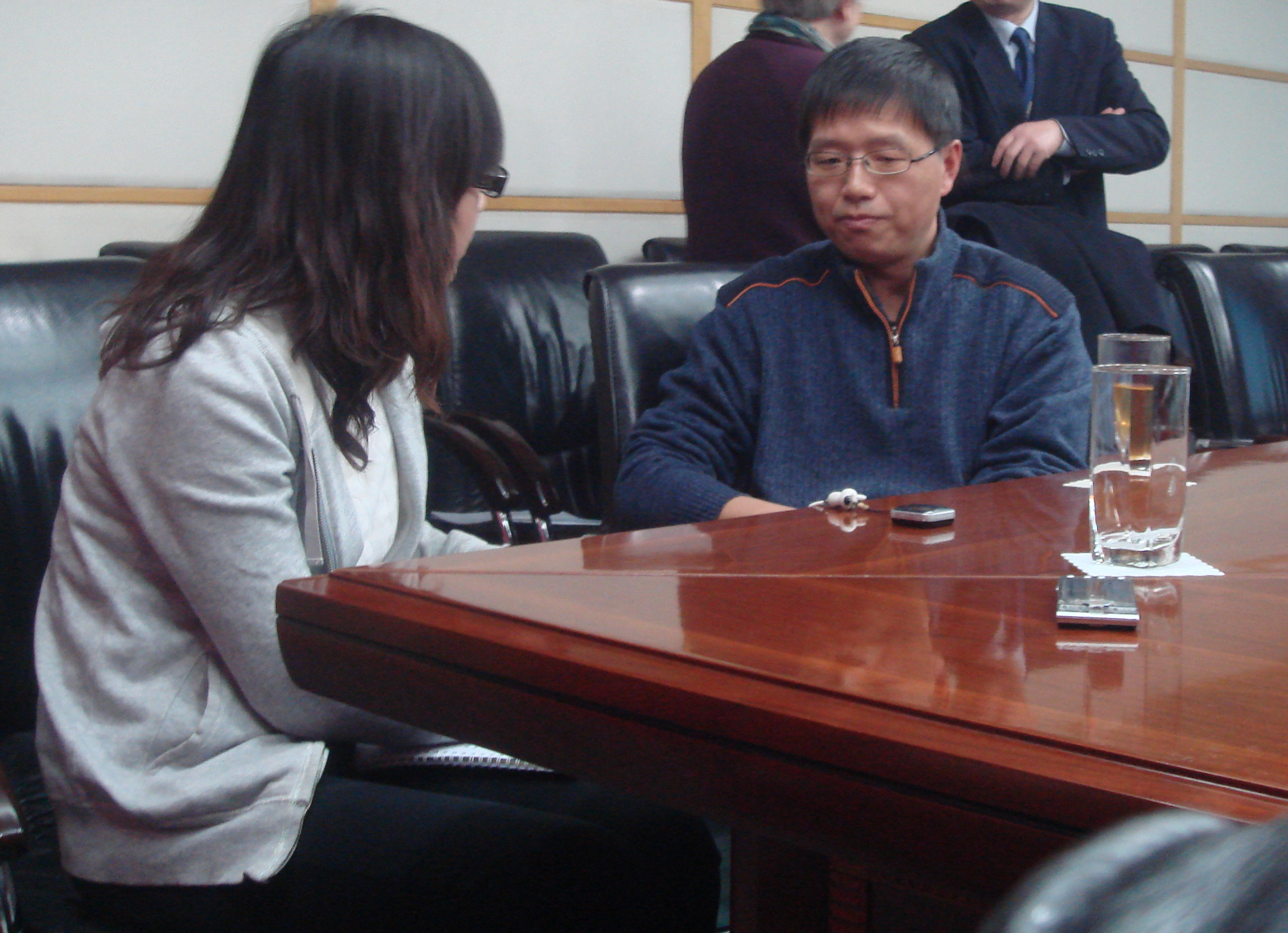Peking University, Nov. 6, 2010: The University of Cambridge Panel with the theme of "Information Access for A Better World: Provenance, Privacy, and Charging" is one of the two special panels in Beijing Forum 2010. During the panel session on the afternoon of Nov. 6, scholars from the University of Cambridge and Peking University had discussions on extensive aspects and from different angles.

The special panel session (PKU News/Meng Shiguang)
Hu Yong, associate professor of PKU School of Journalism and Communication, gave a speech emphasizing the “semantics and significance of information,” which were often neglected.
As one of the first wave of Chinese experts engaged in the research of Internet and new media, Prof. Hu has not only published theses and books but also interpreted a number of world-renowned books about Internet and new media. For example, he is the author of the book Internet: The King Who Rules , the first of its kind in China to introduce the emergence, development, present situation, and future trend of Internet. On account of his prominent work, he is regarded as one of the most important torchbearers in pushing forward the development of Internet in China.
After the panel session, PKU News journalists interviewed Prof. Hu.

Censorship and Publicity
Q: The "Mtime" website has been closed down for some time, which reminds people of many similar cases in China. What are your opinions about Chinese Internet regulations?
A: It's not a newborn question; however, some changes have taken place in the method and strength of Internet regulations. In fact, the supervisors have been boxed in a paradox. On one hand, they regarded the economic benefits brought out by Internet as important. But on the other hand, they worried about the bad influences of harmful and illegal information on the Internet. The duality may be of little influence in the beginning, but with the rapid development of Internet and technology, it is more and more difficult to maintain both hope and worry. China is the most populous country, as well in terms of netizens and world-famous IT companies - Tencent, for example. But China also has the most rigorous censorship regime in the world. Under this contradictory situation, it's not strange to see "Mtime" as a victim.
Q: Yes, with the rapid development of Internet and technology, there have been some changes. Nowadays, we can see that more and more government officials use microblog - or twitter-like weibo - to communicate with netizens. What do you think about it?
A: I don't think there are too many officials using microblog, and I would be happy to find that every publicity administrator uses microblog. If the officials don't go into the cyber communities, they would always stay in their own world where the logic and language are quite different, and they would never understand why some incidents become breaking news on the Internet. Once they go into the public sphere on the Internet, they wouldn't take things for granted as they used to do. So under circumstances that it's harder and harder to get consensus, such efforts and actions should be encouraged. I hope that more and more officials will use microblog in the future, even if they sound bureaucratic at first, it will make a great difference as time passes by.
Information Security
Q: Some business companies use Internet to spread fake information about their competitors, which does harm to both the competitors and the consumers. So what can be done to reduce such kind of behaviors?
A: Confronting this situation, the first reaction of people, including the netizens and involved companies, is turning to government for help. They hope that government could fairly investigate that. However, I don't think it a good solution because the government doesn’t always have proper solutions. China now is carrying out reforms in administrative systems, aiming to turn the all-round government to a confined one. Government is not naturally neutral and has its own considerations. It is important for the government to discharge its duties, but guaranteeing the rights of netizens is more important. Generally speaking, the time when netizens' rights are infringed is just the time when the incidents harm public interests. Netizens themselves can supervise the bad businesses if given abundant rights. We cannot see netizens' resistance because they have been bound up. So it's most important to liberate their power.
Q: That reminds me of the recent conflict between "Tencent" and "Qihoo 360.” What are your suggestions to the users?
A: It would be best if users could gather up and resist efficiently, but it's too difficult for Chinese users to do so. My suggestion is that users abandon the companies which take no users' interests into consideration. It shouldn't be just a slogan that netizens have more organization power and the supporting policies are necessary. For example, some American people appealed against Google to the court for they thought Google's new product infringed their privacy. But in China, it's totally a different picture. The mass victims of "Sanlu" milk powder have little access to the court to ask for their deserved rights. It's really difficult if these supporting policies are absent.
International Communications
Q: Some expats and their communities in China have their own websites or blogs as a window for outside world to see what's happening in China, for example, "Danwei.org” and "Shanghaiist.com." What do you think about the significance of their work for China’s global image-building?
A: I think their efforts are beneficial. Due to linguistic and cultural diversity, it's much easier for foreigners to get and read information via these websites. So this kind of websites can help foreigners understand China better. First of all, these websites are media rooted in China but could connect to the system of Western discourse at the same time. Second, as people having been in China for a long time, initiators and editors of these websites welcome a strong and prosperous China. Actually, they don't have much ideological prejudice. We often talk about soft power, but soft power shouldn't all be influenced by authentic approach like diplomacy. Communication among ordinary people in different countries may have better effect, which is exactly what these websites strive for. I think there should be more such efforts.
Q: Some experts proposed that China's international communications work is in fact “internal promotion through external propaganda.” Could you explain it?
A: It's just a statement from a different perspective. If you deal with things based on the hierarchical “officialdom standard,” what you consider is how to satisfy your superiors rather than the real effect of your actions. If we take international communication as a task regardless of its potential effect, this “communication” would be incommunicable, meaningless, and hopeless.
Extended Reading:
PKU News (Chinese): Channel, Value, and Use of Information
A Collection of PKU News Coverage of Beijing Forum 2010
Reported and Transcribed by: Chen Meng
Edited by: Jacques
Copyright 2010 Peking University News | BeidaNews@pku.edu.cn